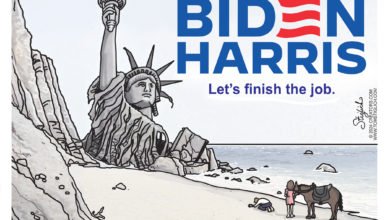The numbers indicate a coming recession
The Bureau of Labor Statistics just released its jobs report for March. It said total employment increased by 431,000. That means that for the first quarter of this year, about 1.6 million jobs were added. Although most economists are forecasting economic growth to be less than a 3% rate for the quarter, that may be a conservative estimate. In fact, the economy may be overheated.
While there are a number of other statistics that point to slow growth for the current quarter, it is difficult to imagine that the economy is experiencing slow growth while adding more than half a million jobs per month. The growth estimate for the first quarter will be released at the end of April. It may surprise the forecasters and show that economic growth is at least 4%.
The inflation number for last month will be released on April 12. All indications point to a monthly increase in the Consumer Price Index of a full 1%. That will increase the inflation rate for the last 12 months to well over 8%. Further, it is likely that the CPI for April, which will be released in mid-May, will also be 1%.
That will raise the 12-month inflation rate to at least 9%. It will also mark the first time since 1980 that the CPI has increased by at least 1% for two consecutive months. If that is the case, the economy is clearly overheated, meaning that the Federal Reserve must be more aggressive in changing its shockingly irresponsible monetary policy.
The Fed will likely raise interest rates by half a percent in April and continue to raise rates another four or five times before the end of the year. That means that interest rates will be at least 2% higher than they are today.
Because the Fed allowed interest rates to remain near zero for all of last year, even as inflation skyrocketed, its aggressive actions to reduce total demand in the economy may result in a slowing economy. The last time the country faced a similar circumstance was in 1981. The resulting high-interest rates took too much demand out of the economy, and a rather severe recession followed.
Many economists today are starting to talk about the forthcoming recession. But it did not have to be this way. Inflation could have been brought down gradually if only the Fed had begun to end its bond-buying program and raise interest rates a year ago when the inflationary signs first appeared.
Prior to last year, the best measure of consumer inflation, the Consumer Price Index (CPI), averaged a monthly increase of about 0.2% per month. That meant that the annual inflation rate was about 2.5%.
In January 2021, the CPI increased by 0.3%. In February, the increase was 0.4%. In March, the increase was 0.6%. And in April, the CPI increased by 0.8%. At that time, the Fed should have seen a building inflation problem. Usually, the Fed stays ahead of inflation. This time, it didn’t act.
The Fed said the inflation was temporary and that it would disappear as soon as the supply chain issues were resolved. So it continued to vastly increase the money supply by purchasing $120 billion monthly of government securities. It also kept interest rates near zero. Both of those actions added to the excess demand in the economy and increased inflation.
By July 2021, the economy was producing at a level that was equal to the production level prior to the pandemic. That meant that while there may be supply issues in some markets, like the market for imports or the one for computer chips, overall supply was not the primary cause of inflation. Yet the Fed continued to sit idly by as inflation worsened.
It is evident that the economy is overheated, meaning that inflation will worsen, causing the Fed to aggressively raise rates. The problem is that a rapid increase in interest rates may take too much demand out of the economy and lead to a recession, maybe as soon as the end of this year.
Cooling an overheated economy, especially after another year of expansionary monetary policy, will be tricky. Get ready for the coming recession.
Content created by Conservative Daily News and some content syndicated through CDN is available for re-publication without charge under the Creative Commons license. Visit our syndication page for details and requirements.




